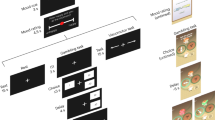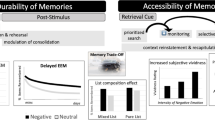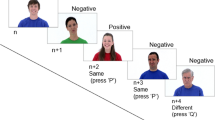Abstract
Few studies have examined mood state-dependent retention—the notion that when the affective states accompanying learning and remembering are the same, information will be retained better than when they differ. Three experiments were conducted to examine state-dependent retention using a simple mood induction procedure and an unselected population of college students. Self-statements developed by Velten (1968) were chosen to influence subjects to feel somewhat depressed or elated or to experience no mood change. A 2 ×2 experimental design, incorporating a single word list and varying the mood conditions present during learning and later testing, was used in each of the first two experiments, neither of which revealed state dependence. However, a significant effect was found in the third experiment, which employed an interference paradigm. Subjects learned two lists of words under differing mood conditions. Testing was conducted under one of two mood conditions, elation or depression. Methodological issues and clinical implications of these findings are discussed.
Similar content being viewed by others
References
Baddeley, A. D., Hatter, J. E., Scott, D., & Snashall, A. (1970). Memory and time of day.Journal of Experimental Psychology, 22 605–609.
Barnes, J. M., & Underwood, B. J. (1959). “Fate” of first-list associations in transfer theory.Journal of Experimental Psychology, 58 97–105.
Battig, W., & Montague, W. (1969). Category norms for verbal items in 56 categories: A replication and extension of the Connecticut category norms.Journal of Experimental Psychology Monograph Supplement, 80(3, Pt. 2).
Beck, A. T., Rush, A. J., Shaw, B. F., & Emery, G. (1979).Cognitive therapy of depression: A treatment manual. New York: Guilford Press.
Birnbaum, I. M., Parker, E. S., Hartley, J. T., & Noble, E. P. (1978). Alcohol and memory: Retrieval processes.Journal of Verbal Learning and Verbal Behavior, 17 325–335.
Bower, G. H. (1981). Mood and memory.American Psychologist, 36 129–148.
Bower, G. H., Gilligan, S. G., & Monteiro, K. P. (1981). Selectivity of learning caused by affective states.Journal of Experimental Psychology: General, 110 451–473.
Bower, G. H., Monteiro, K. P., & Gilligan, S. G. (1978). Emotional mood as a context for learning and recall.Journal of Verbal Learning and Verbal Behavior, 17 573–585.
Buchwald, A. M., Strack, S., & Coyne, J. C. (1981). Demand characteristics and the Velten mood induction procedure.Journal of Consulting and Clinical Psychology, 49 478–479.
Bustamante, J., Jordan, A., Vila, M., Gonzalez, A., & Insua, A. (1970). State dependent learning in humans.Physiology and Behavior, 5 793–796.
Cowan, J. D. (1976). Implications of state dependent learning for drug abuse.Proceedings of the Committee on Problems of Drug Dependence. National Academy of Science, pp. 888–921.
Crow, L. T., & Ball, C. (1975). Alcohol state dependency and autonomic reactivity.Psychophysiology, 12 702–706.
Eich, J. E. (1980). The cue-dependent nature of state-dependent retrieval.Memory and Cognition, 8 157–173.
Eich, J. E., Weingartner, H., Stillman, R. C., & Gillin, J. C. (1975). State dependent accessibility of retrieval cues in the retention of a categorized list.Journal of Verbal Learning and Verbal Behavior, 14 408–417.
Folkard, S. (1979). Time of day and level of processing.Memory and Cognition, 7 247–252.
Godden, D. R., & Baddeley, A. D. (1975). Context-dependent memory in two natural environments: On land and underwater.British Journal of Psychology, 66 325–331.
Goodwin, A. M., & Williams, M. G. (1982). Mood-induction research—Its implications for clinical depression.Behaviour Research and Therapy, 20 373–382.
Hale, W. D., & Strickland, B. R. (1976). The induction of mood states and their effect on cognitive and social behaviors.Journal of Consulting and Clinical Psychology, 44 155.
Henry, G. M., Weingartner, H., & Murphy, D. L. (1973). Influence of affective states and psychoactive drugs on verbal learning and memory.American Journal of Psychiatry, 103 966–971.
Hill, S. D., Schwin, R., Powell, B., & Goodwin, D. (1973). State-dependent effects of marijuana on human memory.Nature, 243 241–242.
Holloway, F. A. (1978). State dependent retrieval based on time of day. In B. Ho, D. W. Richards, & D. L. Chute (Eds.),Drug discrimination and state dependent learning. New York: Academic Press.
Keane, T. M., & Lisman, S. A. (1976, April).Multiple task disruption of alcohol state-dependent retention. Paper presented at the Eastern Psychological Association meetings, New York.
Leight, K. A., & Ellis, H. C. (1981). Emotional mood states, strategies, and state-dependency in memory.Journal of Verbal Learning and Verbal Behavior, 20 251–266.
Levis, D. J. (1980). Implementing the technique of implosive therapy. In A. Goldstein & E. B. Foa (Eds.),Handbook of behavioral intervention. New York: Wiley.
Lisman, S. A. (1974). Alcoholic “blackout”: State dependent learning?Archives of General Psychiatry, 30 46–53.
Macht, M. L., Spear, N. E., & Levis, D. J. (1977). State-dependent retention in humans induced by alterations in affective state.Bulletin of the Psychonomic Society, 10 415–418.
Matheny, K. B., & Blue, F. R. (1977). The effects of self-induced mood states on behavior and physiological arousal.Journal of Clinical Psychology, 33 936–940.
Miller, M. E., Adesso, V. J., Fleming, J. P., Gino, A., & Lauerman, R. (1978). Effects of alcohol on storage and retrieval processes of heavy social drinkers.Journal of Experimental Psychology: Human Learning and Memory, 4 246–255.
Matale, M. (1977). Effects of induced elation-depression on speech in the initial interview.Journal of Consulting and Clinical Psychology, 4 45–52.
Overton, D. A. (1964). State-dependent or “dissociated” learning produced with pentobarbital.Journal of Comparative and Physiological Psychology, 57 3–12.
Overton, D. A. (1972). State-dependent learning produced by alcohol and its relevance to alcoholism. In B. Kissin & H. Begleiter (Eds.),The biology of alcoholism, Vol. 2: Physiology and behavior. New York: Plenum Press.
Overton, D. A. (1978). Major theories of state dependent learning. In B. Ho, D. W. Richards, & D. L. Chute (Eds.),Drug discrimination and state dependent learning. New York: Academic Press.
Overton, D. A. (1982). Memory retrieval failures produced by changes in drug state. In R. L. Isaacson & N. E. Spear (Eds.),The expression of knowledge. New York: Plenum Press.
Paivio, A., Yuille, J. C., & Madigan, S. A. (1968). Concreteness, imagery, and meaningfulness values for 925 nouns.Journal of Experimental Psychology Monograph Supplement, 76(1, Pt. 2).
Petersen, R. C. (1977). Retrieval failures in alcohol state-dependent learning.Psychopharmacology, 55 141–146.
Polivy, J. (1981). On the induction of emotion in the laboratory: Discrete moods or multiple affect states?Journal of Personality and Social Psychology, 41 803–817.
Polivy, J., & Doyle, C. (1980). Laboratory induction of mood states through the reading of self-referent mood statements: Affective changes or demand characteristics?Journal of Abnormal Psychology, 89 286–290.
Schare, M. L., & Lisman, S. A. (1984). Self-statement induction of mood: Some variations and cautions on the Velten procedure.Journal of Clinical Psychology, 40 97–99.
Smith, S. M. (1979). Remembering in and out of context.Journal of Experimental Psychology: Human Learning and Memory, 5 460–471.
Smith, S. M., Glenberg, A., & Bjork, R. A. (1978). Environmental context and human memory.Memory and Cognition, 6 342–353.
Strickland, B. R., Hale, W. D., & Anderson, L. K. (1975). Effect of induced mood states on activity and self reported affect.Journal of Consulting and Clinical Psychology, 43 587.
Trimboli, F. (1973). Changes in voice characteristics as a function of trait and state personality variables.Dissertation Abstracts International, 33(8-B), 3965.
Velten, E. (1968). A laboratory task for induction of mood states.Behaviour Research and Therapy, 6 473–482.
Weingartner, H. (1978). Human state dependent learning. In B. Ho, D. W. Richards, & D. L. Chute (Eds.),Drug discrimination and state dependent learning. New York: Academic Press.
Weingartner, H., & Faillace, L. A. (1971). Alcohol state-dependent learning in man.Journal of Nervous and Mental Disease, 153 395–406.
Weingartner, H., Miller, H., & Murphy, D. L. (1977). Mood-state-dependent recall of verbal associations.Journal of Abnormal Psychology, 86 276–284.
Weingartner, H., Sitaram, N. Gillin, J. C., & Murphy, D. L. (1978). Physostigmine statedependent learning in man. In E. C. Colpaert & J. A. Rosencrans (Eds.),Stimulus properties of drugs: Ten years of progress. Amsterdam: Janssen Research Foundation.
Zuckerman, M., & Lubin, B. (1965).Manual for the Multiple Affective Adjective Checklist. San Diego: Educational and Industrial Testing Service.
Author information
Authors and Affiliations
Additional information
This article is based on the first author's M. A. thesis, conducted under the supervision of the second author. A preliminary report of these data was made at the 1981 meetings of the Eastern Psychological Association, New York. The authors would like to express their thanks to Christian W. Mueller for his assistance in the completion of this research. Research support was provided by NIAAA Grant 5-R01-AA03141 to S. A. Lisman and N. E. Spear.
Rights and permissions
About this article
Cite this article
Schare, M.L., Lisman, S.A. & Spear, N.E. The effects of mood variation on state-dependent retention. Cogn Ther Res 8, 387–407 (1984). https://doi.org/10.1007/BF01173313
Issue Date:
DOI: https://doi.org/10.1007/BF01173313




